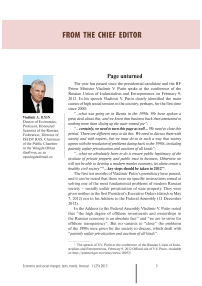Page unturned
Автор: Ilyin Vladimir Aleksandrovich
Журнал: Economic and Social Changes: Facts, Trends, Forecast @volnc-esc-en
Рубрика: From the chief editor
Статья в выпуске: 1 (25) т.6, 2013 года.
Бесплатный доступ
ID: 147223437 Короткий адрес: https://sciup.org/147223437
Текст ред. заметки Page unturned
The year has passed since the presidential candidate and the RF Prime Minister Vladimir V. Putin spoke at the conference of the Russian Union of Industrialists and Entrepreneurs on February 9, 2012. In his speech Vladimir V. Putin clearly identified the main causes of high social tension in the country, perhaps, for the first time since 2000:
“…what was going on in Russia in the 1990s. We have spoken a great deal about this, and we know that business back then amounted to nothing more than slicing up the state-owned pie”;
“… certainly, we need to turn this page as well… We need to close this period. There are different ways to do this. We need to discuss them with society and with experts, but we must do so in such a way that society agrees with the resolution of problems dating back to the 1990s, including patently unfair privatization and auctions of all kinds”;
“…what we absolutely have to do is ensure public legitimacy of the institute of private property and public trust in business. Otherwise we will not be able to develop a modern market economy, let alone create a healthy civil society” “…key steps should be taken in 2012” 1 .
The first ten months of Vladimir Putin’s presidency have passed, and it can be noted that there were no specific instructions aimed at solving one of the most fundamental problems of modern Russian society – socially unfair privatization of state property. They were given neither in the first President’s Executive Orders (dated on May 7, 2012) nor in his Address to the Federal Assembly (12 December 2012).
In the Address to the Federal Assembly Vladimir V. Putin noted that “the high degree of offshore investments and ownerships in the Russian economy is an absolute fact” and “we are to strive for offshore transparency”. But no variants to “close” the problems of the 1990s were given for the society to discuss, which dealt with “ patently unfair privatization and auctions of all kinds” .
Unfair privatization of the 1990s became the basis for the formation of an oligarchic and corrupt system of the state, which brought up the modern political elite and led to an unprecedented income inequality among Russia’s citizens. In Russia, 1% of oligarchs and large owners account for about 40% of national income, while 1% of the richest people in the United States accounts for 8% of national income. Thus, inequality degree is 5 – 10 times higher in Russia than in the USA 2 .
According to one renowned politician, “ … the state power in Russia was forcing against Russia speaking on behalf of Russia during the last decades” 3 .
During the 1990s, existing oligarchic clans extracted minerals in Russia and appropriated most of the resource rents. And only in 2002, on the RF President Vladimir Putin’s initiative a mineral extraction tax (MET) was imposed and tariffs on export were increased. This resulted in a 4.2-fold increase of the federal budget revenues in 2011 as compared with 2000 (in constant prices), and the share of mineral extraction tax and foreign economic activity revenues in the budget increased from 20% to 58.7%4.
At the same time, the government continued to retreat under the pressure of the oligarchs and international financial speculators.
Thus, the last restrictions on foreign exchange regulation were canceled in Russia in 2006, which dramatically accelerated the capital outflow from the country 5 .
According to experts, federal and regional budgets lose up to 50% of tax revenues due to different legal ways to avoid taxes of large corporations and the political elite (tab. 1) .
A serious analysis of the current situation in the country before the elections to the State Duma in December 2011 and the presidential elections in March 2012 in the conditions of the formation of a new political cycle, conducted by numerous experts, public figures, mass media, showed that in order to implement the faster growth policy it was necessary “to restrain the furies of oligarchic business, corrupt officials vampires, a gang of werewolves wearing police epaulets, TV nightmares and other evil spirit bred in abundance on the rotting remains of the Soviet empire. They are the products of the post-Soviet power, so they should be eliminated by it with the purpose of self-preservation. Otherwise, they either will have gorged the power and statehood remnants, or they will have been destroyed by the revolutionary fire. Both results will be catastrophic for Russia”6.
Today’s information field in the country is rather clearly described by journalist M. Kononenko, “We had the dashing 1990s and stable 2000s. And now we have the dashing years again but this time – the 2010s. More precisely – deputy” 7 .
Table 1.Calculation of the possible increase in revenues to the budget of the Russian Federation, trillion rubles
|
Source |
Actual value |
Proposed variant |
Consolidated budget of RF |
Budgets of state non-budgetary funds |
Federal budget |
Budgets of the federal subjects of Russia |
|
Cancellation or reduction of the rate of export VAT refund |
18% |
0–5%*1) |
0.8 |
0.8 |
||
|
Increase in the tax rate on dividends |
5 – 9% |
13 – 15%*1) |
0.2 – 0.5 |
0.2 – 0.5 |
||
|
Introduction of progressive income tax rate |
13%* |
13–50%*2) |
2.0 – 4.5 |
2.0 – 4.5 |
||
|
Introduction of the tax on currency export |
no |
20%*3) |
0.5 |
0.5 |
||
|
Cancelation of the limiting value of annual income, above which insurance payment are not taken |
463 thsd. rub. |
0*4) |
0.5 |
0.5 |
||
|
Total |
4.0 – 6.8 |
0.5 |
1.3 |
2.2 – 5.0 |
||
|
* There are the following income tax rates in foreign countries: USA – 1035%; Great Britain – 050%; Australia – 1747%; China – 545%; Japan – 550%; Denmark – 3859%; Ukraine – 1517%; Latvia – 26%.
|
||||||
Russian mass media is full of facts reflecting the conflict between different groups of the political elite 8 .
It seems that, when the staff of the Government was formed, the President of Russia excessively trusted people allowing some of them, who did not explicitly or implicitly support his policy thesis stated not only in his well-known articles but in his decrees dated May 7, 2012, to be included in the Government.
What other reasons can explain the fact that the Government did not build the funds into the budget for 2013 and 2014 – 2015 to implement the decrees dated May 7, 2012 on the main points of modernizing the economy of the country: increase in the salaries of teachers and doctors since 2013; modernization of the social sphere; the core funding of a militaryindustrial complex was postponed for a period after 2015.
More than 70% of budget expenditures on implementing the presidential decrees to raise wages of public sector employees for the period from 2013 to 2018 fall on the period from 2016 – 2018 ( tab. 2) .
“Citizens of Russia will feel very quickly the mistakes, which were not corrected by the Duma, because the tasks to raise the wages of state employees set by the President are not secured with the real financing; it appears that there is a hole in the regional budgets, which can be covered by nothing. Therefore, it will be not an increase in the wages of regions’ state employees but a profanation” 9 .
“Some commentators explain the retreat in financing of the social sphere by excessive appropriations for rearmament. This is a delusion: the Ministry of Finance treats the defense industry not much better than education. Besides that about a quarter of more than twenty trillion promised for eight years falls on the three-year period, and the Ministry of Finance shifted a part of this money to the following budgetary cycle replacing them by the loans of commercial banks during the current cycle.
The federal budget adopted in the third reading does not solve any problem: at best, it cowardly moves them for the indeterminate future. I’m not talking about the fact that it is plain folly to throw out money saved due to the castration of necessary expenses into formally security Western bonds. Throwing hundreds of billion rubles of our common resource rents into this maelstrom as before is only a little bit wildly than burning them” 10 .
In recent years, the most part of budget funding was shifted onto the lower levels. Governmental budget compels a significant part of the regional budgets to increase the national debt up to a critical point, increase commercial loans, and thus, it tightens a debt stranglehold.
Unfortunately, the increase in the role of federal budget is not provided in years to come.
All these and many other facts show that the Government of Dmitry A. Medvedev works in harness as “circular firing squad”, because the influence of elite groups holding
Table 2. Distribution of budget expenditures for the wages of public sector employees in the period from 2013 to 2018
One of the principal points of divergence is the Government’s desire to carry out the rapid privatization of state property once again. It seems that the point of view of the famous writer and economist N. Starikov is rather convincing.
“…1. The current round of privatization, which is guided personally by the Prime Minister Dmitry Medvedev, does not make sense from the standpoint of economics. Today there is no urgent need for money to sell the last shirt like a regular alcoholic in front of a pub.
-
2. The current round of privatization is none other than the camouflaged and accompanied by beautiful phrases free transfer of Russia’s state property to the West.
-
3. Medvedev plans such a privatization only owing to ideological reasons. Dmitry Medvedev and his Government believe for some reason that it would be better for Russia” 11 .
In this situation, there is a natural question: will the Government led by Dmitry A. Medvedev be able to realize the goals stated in the programme of the President Vladimir V. Putin and specified in his decree of May 7, 2012?
In all probability, the RF President Vladimir V. Putin should continue the systemic unconditional implementation of his election programme for benefit of the future of the country and most people in Russia. One of these steps could be considering for the basis the suggestions of RAS Academician S.Yu. Glazyev and RAS Corresponding Member G.G. Fetisov set in the report “On the strategy of sustainable development of Russia’s economy” 12 .
The breakthrough strategy “differs from the programmes offered by governmental and other ‘system-related’ experts in the fact, that though it deals mainly with the economy, it overcomes the ‘macroeconomic determinism’, by integrating this important area of the state’s responsibility into the global and Russian historical context: science, technology, culture, rational nature management, political and civil relations – these ‘productive forces’ are as important as finances or entrepreneurial initiative” 13 .
In recent months, it can be clearly seen the President’s activity in initiating the additional measures to create the conditions for the implementation of his election programme aimed at the significant improvement of life quality of most people, strengthening of Russia’s competitiveness in a globalizing
Тable 3. Dynamics of the approval index of the RF President among different social groups in the Vologda Oblast
Apparently, this is only the beginning of painful purification of various power federal and regional elite clans from all the kinds of corrupt officials, immoral persons in political and economic life of the country.
The solution of the main problem of the early 1990s – unfair privatization – and it is the base in large part of political clans, will require system measures for not only “convincing” the members of the Government, but also improving moral climate in the country; and it should be done without destroying the capacity of the state, more than 45 million electors of Vladimir V. Putin voted for this.
The President Vladimir V. Putin could not turn over the page of unfair privatization in 2012. It is 2013. We waited for a longer time. But the RF President Vladimir V. Putin should not stop, it is necessary to pull this thorn out of the soul of a Russian citizen. We must turn over the page!
It should be noted that the long sociological monitoring shows the evolution of citizens’ estimates of political leaders, including the Head of the state. The Editorial Board of the Journal regularly publishes the results of this monitoring that concerns the dynamics of the changes in the population’s approval of the President of the Russian Federation, the Prime Minister, governmental institutes and political parties.
If we compare the approval ratings of the President Vladimir V. Putin in 2007, at the end of his second term, and the approval ratings of the President Dmitry A. Medvedev in 2011, during the last year of his presidency, we can see that Dmitry A. Medvedev lost from 25% to 30% of people who approved his activity as the Head of the state (tab. 3) . That is an objective evaluation of his activities in the period from 2008 to 2011 by the region’s population.
A more detailed information is given below, in the diagrams (P. 16-19).
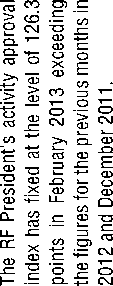
"О 03 CD
« S ОТ

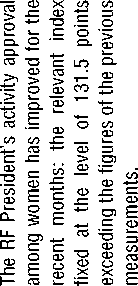
Dynamics of the RF President’s activity approval index*
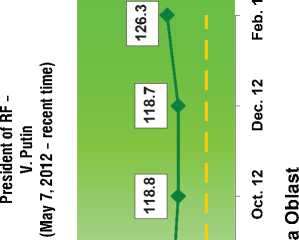
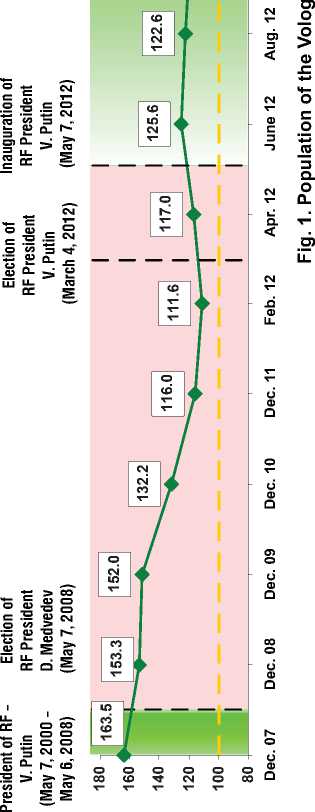
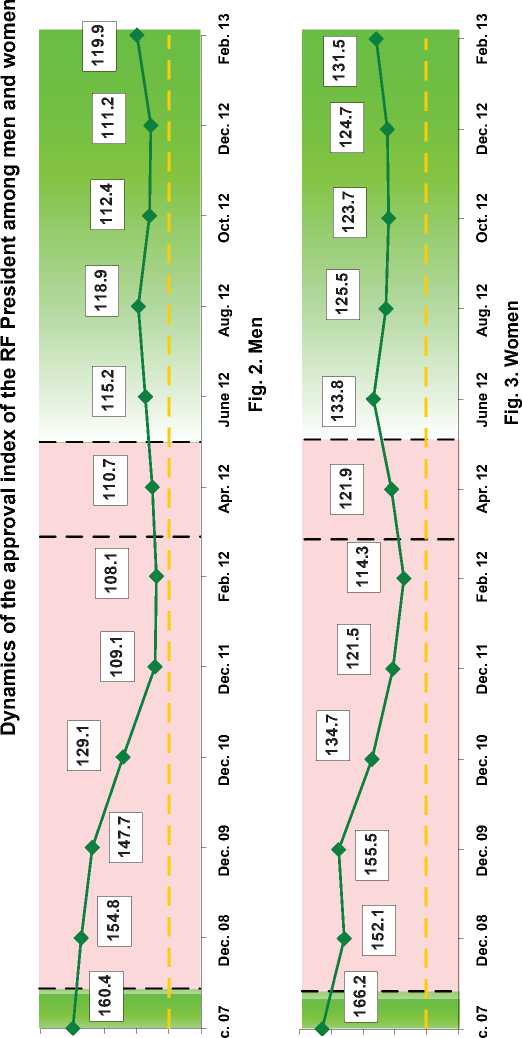
* The balance of positive and negative responses has been marked by a yellow dotted line (index is equal to 100 points) Index above 100 points indicates the predominance of positive responses over negative ones (green), index below 100 points – the opposite situation (red).
О О О О О О S О О О О О О ri
00 CP Tf СЧ О 00 LJ 00 СР ^ СЧ О 00 Ш
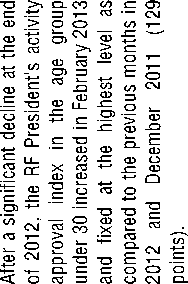
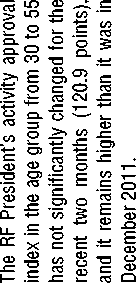
Dynamics of the RF President’s activity approval index in the age groups




Fig. 6. Age group over 55
Dynamics of the RF President’s activity approval index in the education groups





СЗ
О о





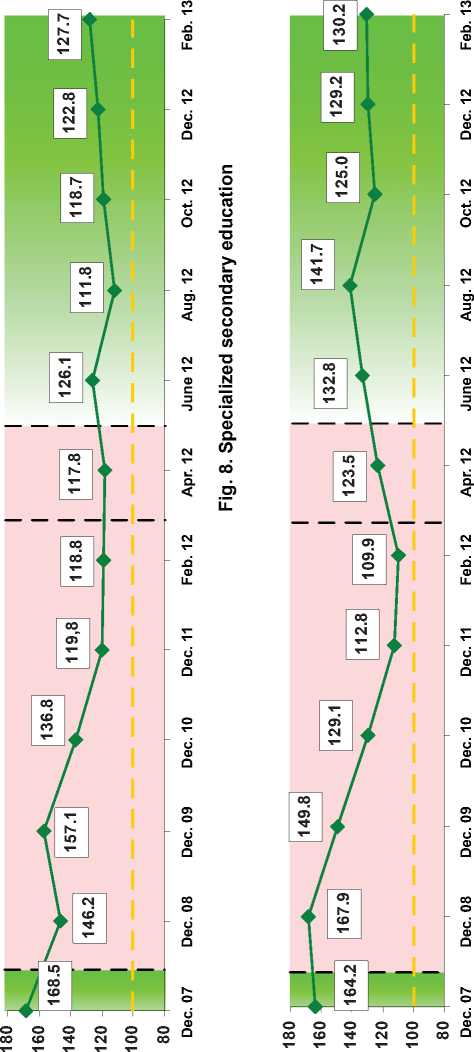
Fig. 9. Higher and incomplete higher education
Dynamics of the RF President’s activity approval index in the income groups
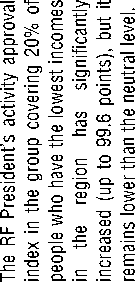

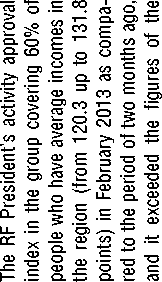
E "5 о
I

ООО о о о 5 00 СО ^ СМ О 00 и
cc
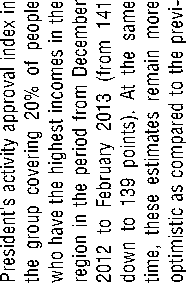
E
E
■5 о

Fig. 12. 20% with the highest income
О ОО ОО О о 00 СО ^ СМ О 00 ш
As in the previous issues, we publish the results of the recent public opinion monitoring of the state of the Russian society *.
The following tables show the dynamics of some parameters of social well-being and socio-political sentiments in the Vologda Oblast for the period from December 2011 to February 2013.
Table 1. Estimation of power activity (How do you assess the current activity of..?)
|
Vertical power structure |
Approval, in % to the total number of respondents |
Dynamics indices, Feb. 2013 to Dec. 2011 |
Dynamics indices, Feb. 2013 to Dec. 2012 |
|||||||||
|
Dec. 2011 |
Feb. 2012 |
Apr. 2012 |
June 2012 |
Aug. 2012 |
Oct. 2012 |
Dec. 2012 |
Feb. 2013 |
|||||
|
The President of the RF |
51.7 |
47.3 |
50.3 |
54.5 |
53.7 |
50.9 |
53.3 |
55.5 |
1.07 |
1.04 |
||
|
The Chairman of the Government of the RF |
52.9 |
52.6 |
51.7 |
49.5 |
48.5 |
47.1 |
48.3 |
47.9 |
1 0.91 |
1 0.99 |
||
|
The Governor of the Vologda Oblast |
41.9 |
37.7 |
37.7 |
44.7 |
45.3 |
43.6 |
42.5 |
43.0 |
1.03 |
1.01 |
||
|
Vertical power structure |
Disapproval in % to the total number of respondents |
Dynamics indices, Feb. 2013 to Dec. 2011 |
Dynamics indices, Feb. 2013 to Dec. 2012 |
|||||||||||
|
Dec. 2011 |
Feb. 2012 |
Apr. 2012 |
June 2012 |
Aug. 2012 |
Oct. 2012 |
Dec. 2012 |
Feb. 2013 |
|||||||
|
The President of the RF |
35.7 |
35.7 |
33.3 |
28.9 |
31.1 |
32.1 |
34.6 |
29.2 |
0 |
.82 |
0 |
.84 |
||
|
The Chairman of the Government of the RF |
32.7 |
32.0 |
33.1 |
31.5 |
34.5 |
32.8 |
35.9 |
34.4 |
1.05 |
0 |
.96 |
|||
|
The Governor of the Vologda Oblast |
6.1 |
33.8 |
32.6 |
31.8 |
32.7 |
33.7 |
35.4 |
33.8 |
0 |
.94 |
0 |
.95 |
||
Notes. Hereinafter, it is pointed out: green – improvement; yellow – without changes; red – change for the worse.
Table 2. What party expresses your interests?
|
Party |
In % to the total number of respondents |
Dynamics indices, Feb. 2013 to Dec. 2011 |
Dynamics indices, Feb. 2013 to Dec. 2012 |
||||||||||
|
Dec. 2011 |
Elections for the State Duma 2011, fact |
Feb. 2012 |
Apr. 2012 |
June 2012 |
Aug. 2012 |
Oct. 2012 |
Dec. 2012 |
Feb. 2013 |
|||||
|
United Russia |
26.1 |
33.4 |
26.0 |
28.3 |
31.9 |
31.4 |
26.6 |
30.4 |
30.5 |
1.17 |
1.00 |
||
|
KPRF |
13.4 |
16.8 |
10.1 |
11.4 |
10.0 |
9.5 |
10.4 |
12.2 |
9.7 |
0.72 |
0.80 |
||
|
LDPR |
9.2 |
15.4 |
9.1 |
9.5 |
7.7 |
6.7 |
6.8 |
7.2 |
6.3 |
0.68 |
0.88 |
||
|
Just Russia |
13.9 |
27.2 |
10.2 |
8.2 |
4.6 |
5.6 |
5.5 |
5.5 |
5.3 |
0.38 |
0.96 |
||
|
Other |
4.6 |
– |
3.1 |
3.2 |
2.8 |
2.3 |
2.4 |
3.5 |
3.5 |
0.76 |
1.00 |
||
|
No party |
23.9 |
– |
25.7 |
28.6 |
31.5 |
33.2 |
36.1 |
32.5 |
35.3 |
1.48 |
1.09 |
||
|
It’s difficult to answer |
9.0 |
– |
15.8 |
10.8 |
11.6 |
11.1 |
12.3 |
8.7 |
9.3 |
1.03 |
1.07 |
||
Table 3. Estimation of social condition
|
In % to the total number of respondents |
Dynamics indices, Feb. 2013 to Dec. 2011 |
Dynamics indices, Feb. 2013 to Dec. 2012 |
||||||||||
|
Dec. 2011 |
Feb. 2012 |
Apr. 2012 |
June 2012 |
Aug. 2012 |
Oct. 2012 |
Dec. 2012 |
Feb. 2013 |
|||||
|
What would you say about your mood in the last days? |
||||||||||||
|
Usual condition, good mood |
||||||||||||
|
64.2 |
62.9 |
63.4 |
69.0 |
71.3 |
69.0 |
68.0 |
66.6 |
1.04 |
I |
0.98 |
||
|
Feeling stress, anger, fear, depression |
||||||||||||
|
30.2 |
33.5 |
30.2 |
23.4 |
23.3 |
25.5 |
26.5 |
30.5 |
1.01 |
1.15 |
|||
|
What statement, in your opinion, suits the current occasion best of all? |
||||||||||||
|
Everything is not so bad; it’s difficult to live, but it’s possible to stand it |
||||||||||||
|
78.6 |
74.9 |
76.5 |
77.3 |
73.2 |
77.5 |
79.9 |
75.5 |
0.96 |
0.94 |
|||
|
It’s impossible to bear such plight |
||||||||||||
|
14.1 |
18.1 |
16.8 |
13.6 |
17.0 |
15.6 |
13.7 |
16.1 |
1.14 |
1.18 |
|||
|
Consumer Sentiment Index |
||||||||||||
|
85.6 |
89.8 |
90.1 |
93.4 |
92.3 |
91.7 |
91.7 |
92.3 |
1.08 |
1.01 |
|||
|
What category do you belong to? |
||||||||||||
|
The share of people who consider themselves to be poor and extremely poor |
||||||||||||
|
41.9 |
43.2 |
43.6 |
45.0 |
44.2 |
44.1 |
47.0 |
45.9 |
1.10 |
I |
0.98 |
||
|
The share of people who consider themselves to have average income |
||||||||||||
|
42.2 |
44.9 |
46.5 |
45.3 |
43.4 |
44.7 |
43.4 |
44.3 |
1.05 |
1.02 |
|||
j
As in the previous issues, we publish the journal articles rating in this one.
The first ten articles, published in 2010-2013, according to the frequency of their viewing for the recent 12 months (March 2012 — February 2013)
|
5 |
” G "U > Ш “ О ГО Ъ <С g g о < — m |
го |
if |
"го со |
° В, о го CD S < ш ш ш > < > 9 -о Го I 2 .9 ^ > °- го |
го |
1 || "го CD ГО « о сБ й |
о g S го < G eg 1 ^ |
||
|
го £ 03 го оз ■= сс |
§ Б |
5 ° |
5 ° |
§ ст |
о gj 3 |
5 ° |
<с S |
|||
|
О |
о |
О |
6 |
о |
||||||
|
03 03 Е ст о ? ■— С " ГО а> В В с "g ■— к ~ У е |
со |
см |
СП |
го; |
со |
см |
||||
|
- м б S | > £ Е |
Б |
СО |
Го; |
СО |
со |
а |
СО |
со |
^z |
го- |
|
I £ g " Е 2 см |
CD |
CD |
СО |
Б |
та |
to |
^ |
9 |
о |
со |
|
2 $ 2 Ё о = 1^61 о — ” |
CD |
S |
3 |
3 |
со |
со |
та |
3 |
О |
СО |
|
« ст "о ? „ Е ~ ш 11111 о го |
3 |
ст |
8 |
сч |
от |
3 |
со |
я |
Б |
|
|
03 ст о го S s f £ _ № О = го аз е Е р = j~ Е |
3 |
к |
та |
§ |
со |
со |
||||
|
"Е |
§5 S2 f 8 ° i 1 CD ZD ГО О ° О> § ” |
Е У О CD. О 2 £ го 3 сс g G ГО Q) £ £ О О О щ Ё =■'£ Е > В £ .Е |
i1 £ в |
го 5 го го |
I £ о ° ■Е £ ст g 'о CD |
g "оз Е со о о |
"53 -^ "^ го ii го го |
о с: О "ГО ш го Е |
— о £ s ё g Го Го ч-и го 03 g S о ГО | ° ГО ГО 03 £ £ Е О CD "^ Ш ё -1 Е ° с "F s ° CD ГО V) ГО ГО Q ГО ГО CD <С > DC cd |
■° 5 " -S 2 § е £ о в 5 |
|
бицеу |
1- |
сч |
СО |
го- |
та |
ю |
Г- |
со |
от |
CD |
Account of the site’s viewing has been carried out since 2009, December, 12.
Список литературы Page unturned
- The speech of V.V. Putin at the conference of the Russian Union of Industrialists and Entrepreneurs, February 9, 2012.Official site of V.V. Putin. Available at: http://premier.gov.ru/events/news/18052/
- Yashina G.А. Progressive taxation: “pros and cons”. Federal Internet Edition “Capital of the country”. Available at: http:www/kapitalrus.ru/articles/article/177034
- ShevchenkoМ. Financial triumphs. Zavtra. 2012. No. 37.
- Glazyev S.Yu. Why is Putin? Zavtra. 2012. No. 9
- Kononenko M. Dashing deputy. Izvestia. 2013. No. 32. February 21
- Dmitrieva О. Citizens of Russia will feel very quickly the mistakes, which were not corrected by the Duma. Kommersant FM, 19.11.2012. Available at: http://kommersant.ru/doc/2068055
- Privalov А. On ostrich budget. Expert. 2012.No. 47. November 21.

